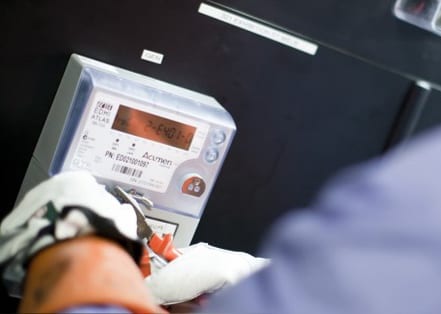The new owners of Origin Energy’s smart meter business have won the backing of the federal government’s Clean Energy Finance Corporation, in the green bank’s first financing of what will be a key technology in an increasingly distributed solar and storage-based energy market.
The CEFC said on Tuesday it had committed $35 million of debt finance to the expansion of intelliHUB – a joint venture between Pacific Equity Partners and global smart meter leader Landis+Gyr.
The two companies agreed to buy Acumen for $267 million in May, seizing what PEP managing director Cameron Blanks described at the time as a long-term opportunity, with millions of Australian households set to switch from analogue electricity meters to smart digital meters.
The shift to smart metering technology is considered to be a crucial part of Australia’s energy market transformation, both for consumers and for the incumbent industry players – particularly energy providers.
For consumers, smart meters are expected to deliver more control over the way they consume energy, from the grid and from their own solar and battery storage systems.
“Direct customer benefit is now the main theme,” said Monique Spanbrook, general manager of marketing and communications for Landis+Gyr Australia, New Zealand and Asia-Pacific, in an interview with One Step Off The Grid last month.
“It’s about, ‘What’s happening inside my home?’ And with knowledge comes the ability to react. …It’s about predicting issues for your customer before they happen.”
But as well as working for consumers, the technology would also help to re-build a bridge between consumers and energy providers, where – as we reported here last week – trust has been seriously eroded.
We need that bridge, because – as ARENA CEO Ian Kay told the Large-Scale Solar and Storage conference in Sydney last week – roughly 40 per cent of the installed capacity of Austraila’s electricity generation by 2040 will come from solar installed in houses, on roofs, and stored in batteries, or in EVs in driveways.
The way all of this distributed and stored solar generation is controlled will quickly become very important, Kay said, as will control over the combined load of the nation’s millions of air-conditioners and pool pumps.
“The future of energy means that more and more, people are going to pull away from the grid,” said Spanbrook. “But we need the grid, if we are going to make smart cities.
“Our government has been pretty slow with legislation, and also with the regulation, working out how the various stakeholders are going to (monetise) new smart energy technology, like solar and battery storage.
“But the customers are choosing it anyway. So it’s absolutely crucial that … we digitise all of that, so that we understand what’s happening from one end of the grid to the other,” she said.
“The whole idea is catching the energy industry up with current technology.”
The Acumen business included the existing management and servicing of 170,000 meters and the promise of future, long-term contracts with Origin Energy and other retailers, including the rollout and management of more than 1 million smart meters across Australia and New Zealand.
The CEFC said the investment was part of a debt finance package to support both the Acumen acquisition and intelliHUB’s growth plans for the business.
“Smart meters give energy consumers better control over their energy consumption, which is essential for lowering carbon emissions,” said CEFC CEO Ian Learmonth.
“They also give consumers the ability to better understand where and how they can benefit from behind-the-meter solar PV and energy storage solutions.
“We see smart metering as an essential part of an integrated clean energy future and we’re very excited to be part of this market evolution,” Learmonth said.
The investment by the CEFC comes as Australia’s new ‘Power of Choice’ reforms are rolled out, requiring all new and replacement electricity meters to use smart technology, to give consumers more control over their energy use.
“There are some 9 million metering points in the National Electricity Market,” said CEFC grid solutions and storage lead Simon Brooker.
“By accelerating their conversion to smarter technologies, customers will benefit from more meaningful information relating to their energy consumption.
“Through improved data provision. electricity network operators will be able to harness greater insights to enable a smoother operation of the energy grid, facilitating improved integration of renewables and energy storage,” Brooker said.
And the CEFC is not alone in seeing value in the new Acumen-based business. According to intelliHUB CEO Adrian Clark, it is one of a number of high profile investors to sign up to back the company’s planned metering deployments.
“I am confident that together we can deliver technology and innovation in smart metering and drive connectivity and competition,” Clark said.








